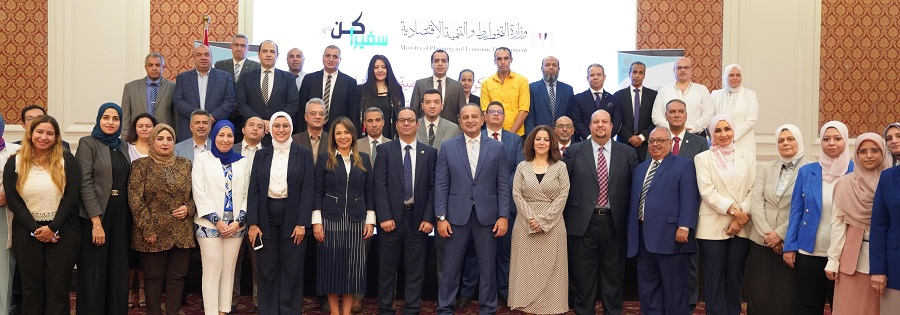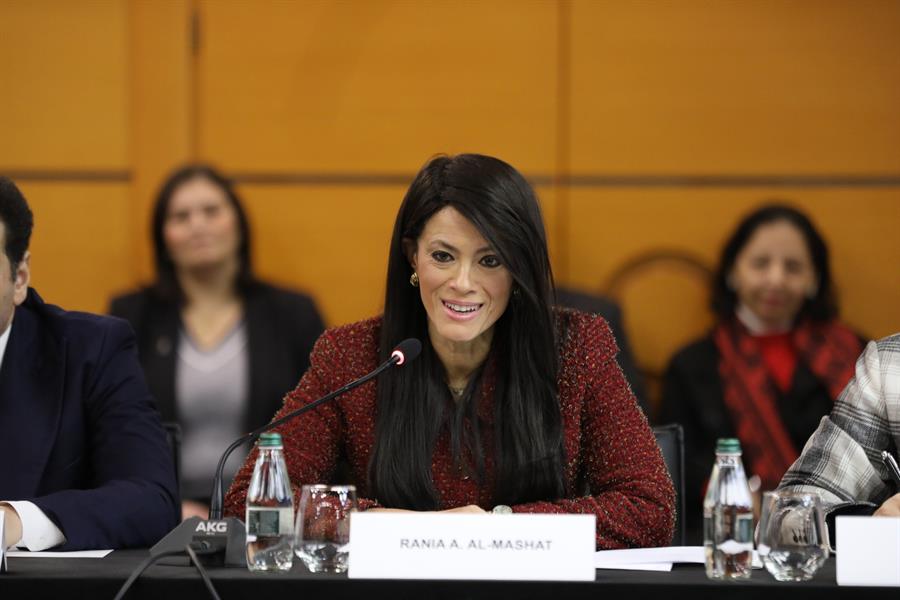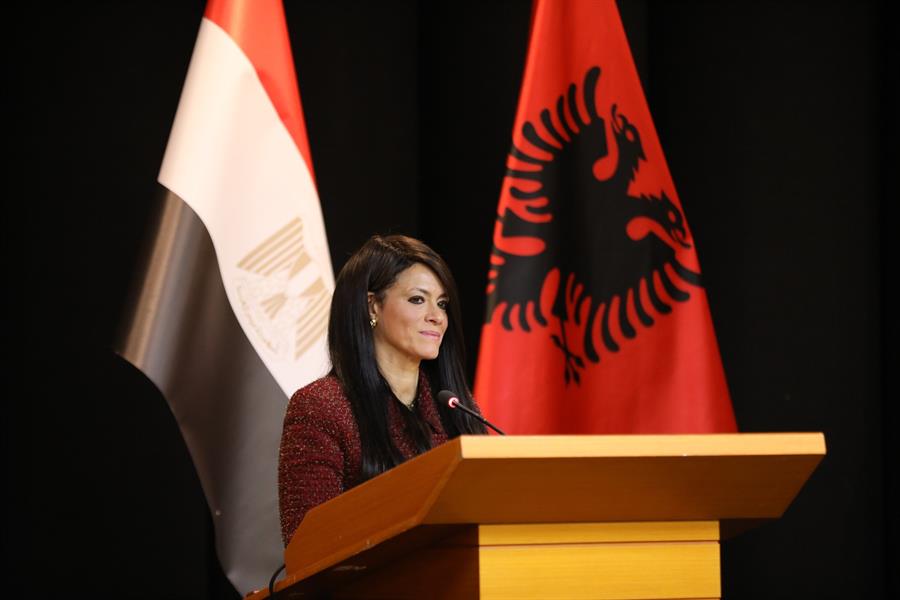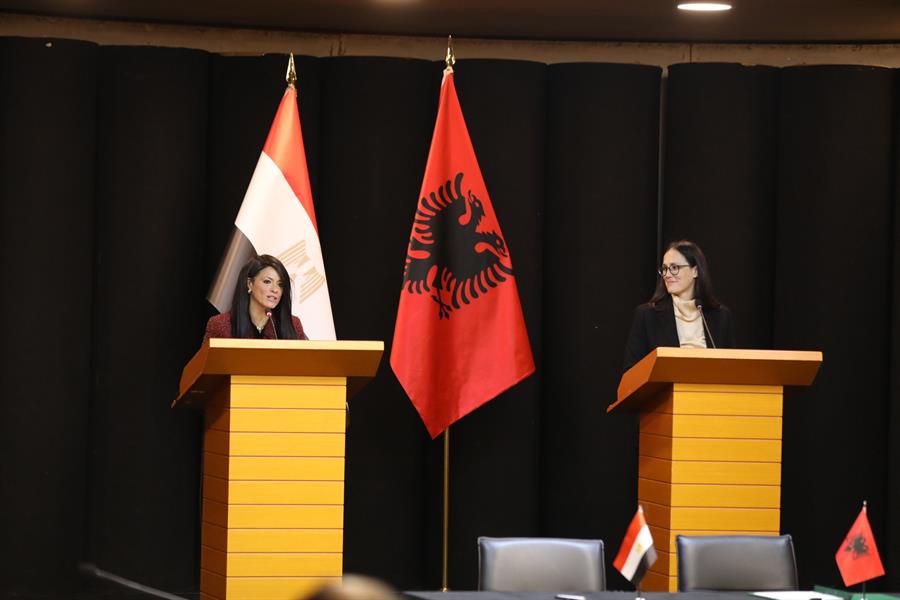Deputy Planning Minister inaugurates a workshop entitled "Green public investments" of the initiative "Be an Ambassador"

01 October 2023
The Deputy Minister of Planning and Economic Development, Dr. Ahmed Kamali, today inaugurated the "Be an Ambassador" workshop for planning authorities, an initiative organized by the Ministry of Planning and Economy and the National Institute for Governance and Sustainable Development (NIGSD) under the title “Greening Public Investments,” during the period from 1 to 3 of this October.
The opening ceremony witnessed the presence of Dr. Jamil Helmy, Deputy Minister of Sustainable Development Oversight, Dr. Mona Essam, Deputy Minister of Sustainable Development, and Dr. Hussein Abaza, former UN Environment Program expert.
In his speech, Kamali said that the training program is a participatory workshop with about 27 ministries, including ministerial assistants and assistants and departments, to improve the capacity of investment planning officials with ministries and exchange experiences on mechanisms to observe environmental sustainability standards.
Kamali added that it is important to launch the "Be an Ambassador" initiative of the planning authorities entitled "Green Public Investments" as part of efforts to include the environmental dimension in sustainability plans in line with Egypt's Vision 2030.
The initiative will help achieve the goal of the Egyptian government to green the investment plan so that by 24/2025 the share of green public investments will be 50% of all public investments.
Kamali explained that some issues related to environmental dimensions were raised during the launch of the integrated planning and monitoring system, which indicated that the project has an environmental and social dimension and that is the beginning of integration of these dimensions.
Kamali spoke about the efforts of the Egyptian government, especially the Ministry of Planning and Economic Development, in the field of sustainable development in Egypt.
Kamali named the Vision of Egypt 2030 as the guiding framework for Egyptian planning, launched in 2016 and recently updated to integrate changes in the country as well as regional and international frameworks, adding that as a result, the challenges ahead had to be taken into account on the Egyptian and international scene.
Kamali referred to the launch of the National Economic Reform Program of Egypt in 2016, explaining that the program reaped its fruits in the increase of the economic growth of Egypt, which was then affected by successive crises of COVID-19 and geopolitical crises.
The program included targets for Egypt's productive sectors, including tourism, manufacturing, agriculture, communications, and information technology.
Meanwhile, Kamali emphasized the importance of structural reforms as the restructuring program focuses on and addresses structural impediments in various sectors.
The program aims to transform Egypt's economy into a productive, knowledge-based economy that is competitive in the global economy to promote inclusive growth, create decent and productive job opportunities, and diversify and develop production models.
Kamali discussed green change, explaining that it did not simply start with the launch of an electronic system for planning and monitoring, but started with the recovery phase from the effects of the crisis.
Kamali referred to the pioneering experience of the Egyptian state in the field of green recovery, where the share of green projects rose to 40 percent of the country's investment plan for the fiscal year 22/2023 in a short time as a result of the expansion of public investments related to the green economy.
Kamali emphasized that the interest in clean mass transport will help reduce emissions. Kamali also pointed out that the Ministry of Planning and Economy launched the National Smart Green Projects Initiative in the provinces of the Republic during the COP27 climate conference, with about 6,280 projects reaching the first phase that contributes to the interaction of rulers and places with the environmental dimension.
Kamali also addressed the localization of sustainable development goals and noted the interest of the Egyptian state represented by the Ministry of Planning and Economic Development in the localization process due to its important dimensions.
He further stated that the ministry, in collaboration with the United Nations, is working to locate the sustainable development goals so that the indicators are implemented at the provincial level.
Kamali explained that there are large differences in the indicators of the counties and emphasized the need to recognize this difference to identify and address development gaps.
Kamali noted that at the local level, 27 reports have been published to locate the SDGs, which are being updated and will be published soon. He also emphasized the launch of the competitiveness index at the county level, which measures the competitiveness of the Egyptian economy against other economies in the world.
Kamali added that based on the principle that economic development must start from the provinces to the central government, the idea of compiling a competitive index was started in collaboration with civil society, the United Nations, and the international competitive index approach.
Kamal also referred to a financial equation that ensures an objective and transparent distribution of investments by integrating several variables into the equation, including those approved for different counties based on a scientific approach based on a transparent methodology taking into account social and demographic dimensions in each county.
Kamali continued that these efforts led to an improvement in Egypt's performance in the 2023 Sustainable Development Index, where Egypt rose 6 places to 81st out of 166 countries compiled by sustainability expert Professor Jeffrey Sachs. The average for Egypt exceeds the regional average in MENA.
Kamali explained that the initiative Be an Ambassador for Sustainable Development is at the forefront of programs that consider it extremely important to spread the culture of sustainable development and its practice among Egyptian youth, such as three groups of young people aged 18-35 years.
Kamali continued that one of the fundamental principles of sustainable development is the principle of leaving no one behind, referring to the graduation of a class specializing in deaf sign language held last week in light of International Sign Language Day and Deaf Empowerment Week.
Moreover, Dr. Jamil Helmy discussed the main objectives of organizing the workshop and explained that the greening of state investments is the current trend of the Egyptian government, which will reach 50% in the 2024/2025 plan of next year.
Helmy explained that when the green public investment accounting started, the percentage was 15%, and then they started to prepare a guide on environmental sustainability standards, which aims to inform all ministries about the quality of green projects to evaluate future projects.
Jameel explained that it turned out that the existing green projects mainly target certain sectors, as 50% of the green projects, which have so far reached 40% of the projects in the plan, target smart transport projects, the housing sector, and renewable energy projects.
Regarding the geographical distribution, Helmy explained that the projects are concentrated in several governorates, which are close to the previous projects because the governorates of Cairo, Giza, and Alexandria constitute the majority of green projects.
Dr. Jamil Helmy continued that 20 percent of green projects are financed by the Decent Life initiative, which helped to achieve the goal of increasing the proportion of green projects in the plan, emphasizing the need to ensure the sustainability of this percentage at the national, geographic level. Helmy also emphasized the importance of spreading awareness about green changes and the importance of a guide to environmental sustainability standards to evaluate the quality of projects during the evaluation process and to measure and set performance indicators.
Helmy continued that 78% of green projects aim at mitigation projects, which explains that the quality of green projects must focus on adaptation projects because this is the current international trend according to the recommendations of international institutions and bodies.









